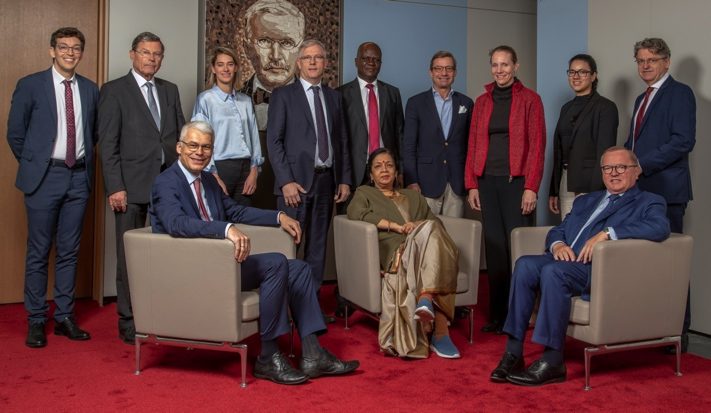Dr. Nandini Azad, the first women on the board & presidium of the International Raiffeisen Union was invited by the IRU & CERA, to deliver a presentation on Youth & cooperatives at Leuven, Belgium recently on the occasion of celebrations of the 130th anniversary of IRU esteemed member organisation CERA and the 30th anniversary of the Belgian Raiffeisen Foundation, a press release from P.Egammai, Secretary of WWF & ICNW read.
Interestingly, NCUI President Dileep Sanghani and its Deputy Chief Executive Mrs Savitri Singh were also invited for the same meeting. The IRU comprises 50 members in 33 countries and from India NCUI, Nafscob, Nafcub, ICNW, NAFCARD are its members.
In her presentation Nandini narrated how young women hailing from humble backgrounds and with zero inputs in terms of resources or education, emerged as successful micro entrepreneurs with the intervention of ICNW. Only through 7-8 loan cycles, their transition from informal to pre-formal sector was achieved, she underlined.
Many young women opt to work independently and conduct petty businesses with low-interest financial support from WWF-ICNW and without collateral or guarantee from their husbands. Some young women learn traditional skills from the family and revive the same with modification in the second generation, preserving cultural heritage in the process, Nandini said in her presentation. Nandini narrated one such story about Vijayalakshmi from Kancheepuram who is into Silk weaving business and was first introduced by her mother in law.
“To cite an instance, Manibala from Dindugal, started to sell vegetables in cart, With ICNW continuous loaning, bought another cart, diversified, sold household provisions along with vegetables. She not only saved gold for the family but also invested in the formal education of her children”, said Nandini.
She said young women members in the WWF-ICNW are now capable of taking decisions, understanding rights, marketing produce, and digitizing businesses as a result of empowerment through digital financial literacy and financial training.
Some are working as well as studying as the 25-year-old Monish, started an onion business through financial assistance from WWF-ICNW and studied in the evening college. In every loan cycle, she invested on expanding business, paid her college fees and finished studies without any parental support, said Nandini
Dr. Azad added that the experience of WWF-ICNW is that even the poor and semi-literate women can manage and run institutions, if they have the right kind of training, financial assistance and field exposure.
Later, the IRU board & CERA recognised this as an inspiring and a great presentation. They also added that it was an exciting input.
Dr Azad met the Indian ambassador in Brussels to inform him about the success of the WWF- ICNW experiment and the pride India brought on women and cooperatives worldwide, as an example of best practices of cooperatives in sustainable development.
The release claims that the Working Women’s Forum (WWF) – Indian Cooperative Network for Women (ICNW) has been a social movement in India for 43 years. Its membership has reached 6,00,000 poor women in South India. It has provided around 5 billion US$ with low interest to micro entrepreneurs in 276 occupations and enterprises both in rural and urban areas.
